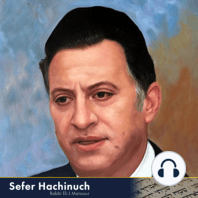20 min listen
Misva #107: The Shemen Ha’mish’ha (Anointing Oil)
FromSefer Hachinuch
ratings:
Length:
20 minutes
Released:
Dec 31, 2021
Format:
Podcast episode
Description
The Torah in Parashat Ki-Tisa (Shemot 30:25) commands Beneh Yisrael to prepare the Shemen Ha’mish’ha – special oil that was used for formally anointing the Kohanim, and for consecrating the sacred articles of the Bet Ha’mikdash. The Sefer Ha’hinuch thus lists as the 107 th Biblical command the obligation to have this oil prepared for the anointing of those requiring anointing with this special oil. Specifically, the Kohen Gadol was anointed with this oil upon receiving the appointment to his post, and kings from the Davidic dynasty would be anointed with this oil upon ascending the throne. (Other kings were not anointed with the Shemen Ha’mish’ha.) The original utensils of the Bet Ha’mikdash, too, required anointing with this oil, but subsequent utensils did not, and instead became formally consecrated by being used for the first time. The Sages inferred this rule from the verse in which G-d says about the Shemen Ha’mish’ha, “Yiheyeh Zeh Li Le’dorotechem” – “this [anointing oil] shall be for Me for your generations” (Shemot 30:31), implying that the anointing of the initial utensils sufficed for all the utensils that would be made in future generations. In explaining the reason behind this Misva, the Sefer Ha’hinuch writes that anointing a Kohen Gadol impresses upon him, and upon the nation generally, the singular importance of his role and of the service in the Bet Ha’mikdash. Formal anointing with oil was a customary ceremony when appointing kings and dignitaries in the ancient world, and so the Torah required anointing the Kohen Gadol to demonstrate his great stature and the significance of his role. The Sefer Ha’hinuch adds that the Torah demands that Shemen Ha’mish’ha must always be available in the Bet Ha’mikdash just as the homes of wealthy people and aristocrats are always stocked with supplies. The homes of people of distinction always have everything that they would need readily available, and so in the Bet Ha’mikdash, too, the Torah required having the Shemen Ha’mish’ha available at all times in case the need arose to anoint a new Kohen Gadol or king. The Shemen Ha’mish’ha was made from 12 “Log” of olive oil, which was boiled with several spices – 500 Shekel of “Mor,” of “Kinnamon,” and of “Kida,” and 250 Shekel of “Keneh Bosem.” Some of the mixture would evaporate during the cooking process, and the result would be a total of 12 “Log” of anointing oil. This is alluded in the aforementioned verse, “Yiheyeh Zeh Li Le’dorotechem,” as the word “Zeh” in Gematria equals 12, alluding to the quantity of 12 “Log” of oil which was prepared. This Misva, of course, applied only in the times of the Bet Ha’mikdash. The Sefer Ha’hinuch writes that this Misva is assigned not to any individual or group of individuals, but rather collectively to the entire nation. As cited earlier, the Torah describes the Shemen Ha’mish’ha as anointing oil that would serve “Le’dorotechem” – “for your generations.” The Sages understood this term to mean that the initial supply of oil which Moshe Rabbenu prepared lasted forever, such that no new Shemen Ha’mish’ha would ever need to be prepared again. The question thus arises as to why the Sefer Ha’hinuch listed this obligation as one of the Torah’s 613 commands. After all, this list includes only those Misvot which apply for eternity, as opposed to commands which were applicable only at one time. Seemingly, once Moshe prepared the Shemen Ha’mish’ha, this Misva was never again practically relevant. Why, then, did the Sefer Ha’hinuch list this Misva as one of the 613 Biblical commands? One fairly simply answer emerges from a close reading of the Sefer Ha’hinuch’s formulation of this Misva. He defines it not as an obligation to produce the Shemen Ha’mish’ha, but rather as an obligation “She’yiheyeh Shemen Ha’mish’ha Muchan Tamid” – to ensure that the anointing oil is always ready. This command requires protecting the supply of Shemen Ha’mish’ha so that it is always available whenever it is needed. Indeed
Released:
Dec 31, 2021
Format:
Podcast episode
Titles in the series (100)
Misva #19: The Prohibition Against Eating Hametz on Pesach: Daily Sefer Hachinuch - Brought to you by itorah.com by Sefer Hachinuch
